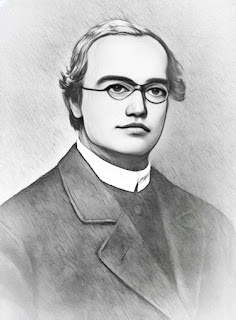Gregor Mendel
Gregor Mendel, an Austrian monk and scientist, is one such figure. Although his groundbreaking studies on heredity and genetics were overlooked during his lifetime, Mendel's insights laid the foundation for modern genetics and continue to shape our knowledge today.
More About His Life
- Early Life: Gregor Mendel was born on July 20, 1822, in a small village called Heinzendorf in what is now the Czech Republic. From a young age, he displayed a curious mind and a love for nature. As a child, he often explored the local gardens, marveling at the diversity of plants and their characteristics. Little did he know that these early experiences would lay the groundwork for his future scientific endeavors.
- Monastic Life: At the age of 21, Mendel entered the Augustinian Abbey of St. Thomas in Brno, Czech Republic, to pursue his education. There, he devoted himself to the study of natural sciences, particularly botany. Mendel's time in the monastery provided him with the opportunity to conduct experiments in the abbey's gardens, where he meticulously observed and documented the traits of various plants.
- The Garden Pea Experiments: Mendel's most significant contribution to science came through his experiments with garden peas. He carefully selected specific traits, such as flower color, seed shape, and plant height, and crossed different varieties of peas to study their offspring. By observing successive generations, Mendel discovered patterns in the way traits were inherited. His work challenged the common belief that traits were simply blended together in offspring, as was previously thought.
- Laws of Inheritance: Mendel's experiments led him to formulate three fundamental principles, now known as Mendel's Laws of Inheritance. The first law, the Law of Segregation, states that each organism carries two copies of a gene, which separate during the formation of reproductive cells. The second law, the Law of Independent Assortment, suggests that different traits are inherited independently of one another. Lastly, the Law of Dominance explains that some traits are dominant over others, determining their appearance in offspring.
- The Legacy of Mendel: Sadly, Mendel's groundbreaking work went unrecognized during his lifetime, and it wasn't until several years after his death in 1884 that his discoveries gained recognition. In the early 1900s, other scientists rediscovered his work and realized its profound significance. Mendel's principles laid the groundwork for modern genetics, providing a framework to understand how traits are passed from one generation to another. His work eventually led to the field of genetics becoming an integral part of biology, agriculture, and medicine.
-min.png)

-min.png)